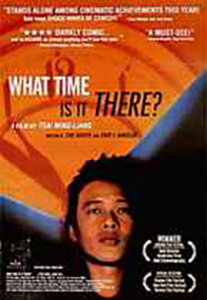 [vc_widget_sidebar sidebar_id=”sidebar-sidebar-reviews”]
[vc_widget_sidebar sidebar_id=”sidebar-sidebar-reviews”]
What Time Is It There
Taiwan (2001), 116 minutes

I need to mention that What Time Is It There is a very slowly paced movie. I have criticized Time Out and Rain for being slow. Am I inconsistent? No doubt, but there is a key difference: in Time Out and Rain, each slowly paced scene shows us only what we already know, but in What Time Is It There, each slowly paced scene reveals something new and important about one of the characters. Moreover, many of the scenes can be seen as vignettes, complete little short, short stories, so they not only add to the overall dramatic payload of the whole movie, they also provide their own self-contained dramas. These dramas are subtle and quiet; the movies messages and themes are conveyed through what you see, not through what the characters say, and you have to think about what you see and interpret it. This is a skill that many moviegoers seem to lack.Afterwards, G-Max and I headed out into the lobby and were confronted by two snickering geezers even older than ourselves, one of whom said with good-natured amusement, “Did you fellers get anything out of that? That was the most boring movie weve ever seen, and we cant make any sense out of it at all.
I snapped back, “I got a lot out of it, and stalked into the mens room.
The cinematography, the acting, and the editing are outstanding. A number of key images recur throughout the film; they resonate with delicate nuances of possible meaning rather than being obviously symbolic or pretentiously significant. And I really liked the soundtrack: most of the scenes are very quiet, with no music, so that on the few occasions when music is used, it adds nicely to the dramatic effect; in this respect, I was reminded of Maborosi.
